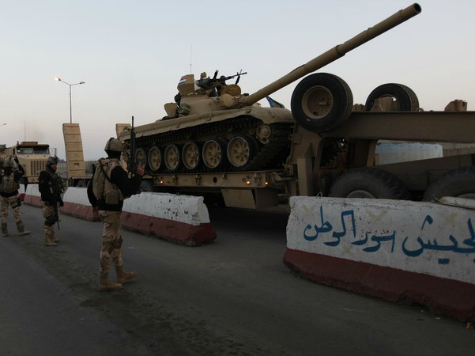(AP) Iraq: Fighters urged to go as supplies run short
By QASSIM ABDUL-ZAHRA and ADAM SCHRECK
Associated Press
BAGHDAD
Tribal leaders in the besieged city of Fallujah warned al-Qaida-linked fighters to leave to avoid a military showdown, echoing a call by Iraq’s prime minister Wednesday that they give up their fight as the government pushes to regain control of mainly Sunni areas west of Baghdad.
The warning came as gunmen attacked an Iraqi army barracks in a Sunni area north of Baghdad, killing 12 soldiers. Seven soldiers were wounded in the assault in Diyala province, authorities said.
The United Nations and the Red Cross, meanwhile, said Fallujah and nearby areas are facing mounting humanitarian concerns as food and water supplies start to run out.
Sectarian tensions have been on the rise for months in Sunni-dominated Anbar province as minority Sunnis protested what they perceive as discrimination and random arrests by the Shiite-led government. Violence spiked after the Dec. 28 arrest of a Sunni lawmaker sought on terrorism charges and the government’s dismantling of a year-old anti-government Sunni protest camp in the provincial capital of Ramadi.
Last week, al-Qaida-linked gunmen seized control of Ramadi and nearby Fallujah, cities that were among the bloodiest battlefields for U.S. forces during the Iraq war. The militants overran police stations and military posts, freed prisoners and set up their own checkpoints.
The United States and Iran have offered material help for the Iraqi government but say they won’t send in troops.
Speaking in his weekly television address, Prime Minister Nouri al-Maliki hinted of a possible pardon for supporters of al-Qaida’s local branch, the Islamic State of Iraq and the Levant, or ISIL, if they abandon the fight.
In exchange, he promised that his government will “open a new page to settle their cases so that they won’t be fuel for the war that is led by al-Qaida.”
Iraq’s government has rushed additional troops and military equipment to Anbar and has been carrying out airstrikes in an effort to dislodge the militants.
Skirmishes between Iraqi forces and militants broke out on the outskirts of Fallujah and Ramadi again Wednesday, according to witnesses, and militants blew up a small bridge on the edge of Ramadi, officials in Anbar said. There was no immediate report of casualties.
At least four crew members were killed when a military helicopter crashed in Anbar, according to army and government officials in the province and state TV. The officials said the cause was poor weather conditions in the area and there was no indication militants brought it down. They spoke on condition of anonymity because they weren’t authorized to release the information.
Influential tribal leaders have been meeting to try to find a way out of the crisis and demanded that al-Qaida members holed up in Fallujah get out of town, said provincial spokesman Dhari al-Rishawi.
That message was echoed over mosque loudspeakers late Tuesday, which also called on fleeing families to come back.
Al-Rishawi and residents reached by phone in Fallujah said at least some of the militants had left the city, which is about 40 miles (65 kilometers) west of Baghdad.
It was not clear how many had gone, or whether they were taking up new positions in different parts of the city.
Markets in the city began reopening Wednesday and some families returned to their homes, though residents complained of shortages of fuel and cooking gas. Civilian cars and trucks were seen on the road and traffic policemen were on the streets.
The militant gains in Anbar are posing the most serious challenge to the Shiite-led government since American forces withdrew in late 2011 after years of bitter warfare following the 2003 invasion that ousted Saddam Hussein’s Sunni-led regime and propelled the formerly repressed Shiite majority to power.
The U.N. envoy to Iraq, Nickolay Mladenov, warned that the humanitarian situation in Anbar is likely to worsen as military operations continue.
Food and water supplies in Fallujah are beginning to run out, and more than 5,000 families have fled to neighboring provinces to escape the fighting, he said.
The International Committee of the Red Cross also voiced concerns about the growing risks to Anbar residents, particularly in Fallujah. Patrick Youssef, head of the Red Cross delegation in Iraq, warned that ongoing power outages and dwindling medical supplies could leave health care facilities unable to provide proper care.
Tensions have been simmering in Iraq since December 2012, when the Sunni community staged protests to denounce what they say is second-class treatment by al-Maliki’s Shiite-led government.
Al-Qaida militants, emboldened by the civil war in neighboring Syria, have sought to position themselves as the Sunnis’ champions against the government, though major Sunni tribes in Anbar and elsewhere oppose the group’s extremist ideology and are fighting against it.
___
Schreck reported from Dubai, United Arab Emirates. Associated Press writer Sinan Salaheddin contributed reporting.
___
Follow Qassim Abdul-Zahra on Twitter at http://www.twitter.com/qabdulzahra and Adam Schreck at https://twitter.com/adamschreck

COMMENTS
Please let us know if you're having issues with commenting.